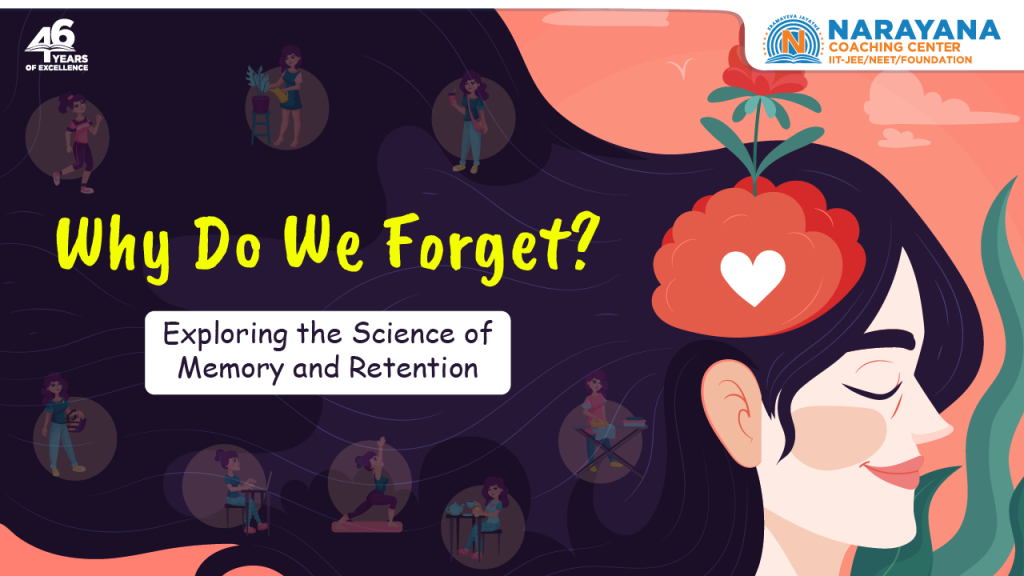
Have you ever spent hours studying a topic only to forget it during an exam? Memory plays a crucial role in academic success, especially for students preparing for competitive exams like JEE and NEET. Understanding why we forget and how memory works can help you retain information more effectively. In this blog, we will explore the science behind forgetting and share practical memory-enhancing techniques tailored for students.
The Science of Memory: How Does It Work?
Our brain processes and stores information in three main stages:
1. Encoding:
- When we learn something new, our brain converts it into a storable format.
- Attention and focus during this stage determine how well we remember later.
2. Storage:
- Information is stored in either short-term or long-term memory.
- Repeated exposure and meaningful connections help transfer knowledge to long-term memory.
3. Retrieval:
- When we need information, our brain retrieves it from stored memory.
- Retrieval can be affected by various factors, including stress, lack of reinforcement, and retrieval practice.
Why Do We Forget?
Forgetting occurs due to several psychological and neurological reasons. Let’s look at some major causes:
1. Decay Theory – “Use It or Lose It
- Information fades over time if not revisited.
- Solution: Regular revision strengthens neural connections.
2. Interference Theory
- Proactive Interference: Older information blocks new learning.
- Retroactive Interference: New information replaces older knowledge.
- Solution: Spaced repetition minimises interference.
3. Lack of Proper Encoding
- If we don’t pay full attention while studying, our brain fails to store the information effectively.
- Solution: Active learning techniques, like note-taking and summarisation, enhance encoding.
4. Stress and Anxiety
- High-pressure exams can trigger memory blocks.
- Solution: Relaxation techniques and confidence-building exercises help recall under stress.
5. Sleep Deprivation
- Sleep is essential for memory consolidation.
- Solution: Getting 7-9 hours of quality sleep improves retention and recall.
Proven Techniques to Improve Memory for JEE & NEET Preparation
Now that we understand why we forget, let’s explore effective strategies to enhance memory retention for competitive exams.
1. Spaced Repetition for Long-Term Retention
- Instead of cramming, review information at increasing intervals (1 day, 3 days, 7 days, etc.).
- Apps like Anki or Quizlet use this method to boost recall.
2. Active Recall: The Best Study Method
- Test yourself rather than just rereading notes.
- Use flashcards, quizzes, or self-explanation techniques to reinforce learning.
3. The Feynman Technique: Simplify to Learn Better
- Teach a concept in simple words as if explaining it to a 6th grader.
- If you struggle to explain it clearly, revisit the topic for better understanding.
4. Mind Maps and Visual Aids
- Organize information visually to enhance connections.
- Create diagrams, charts, and colour-coded notes to enhance retention.
5. The Pomodoro Technique: Study in Focused Bursts
- Study for 25 minutes; take a 5-minute break.
- This method helps maintain focus and prevents burnout.
6. Mnemonic Devices for Memorisation
- Use acronyms, rhymes, and chunking methods to remember complex information.
- Example: To recall trigonometric ratios, use SOH-CAH-TOA.
7. Healthy Lifestyle Choices to Boost Brain Power
- Nutrition: Eat brain-friendly foods like nuts, dark chocolate, and leafy greens.
- Exercise: Physical activity improves oxygen flow to the brain.
- Hydration: Drink enough water to maintain cognitive function.
8. Quality Sleep for Memory Consolidation
- Aim for deep sleep cycles to reinforce learning.
- Avoid screens before bedtime to improve sleep quality.
9. Group Study and Teaching Others
- Discussing topics with friends strengthens memory.
- Teaching someone else reinforces understanding.
10. Stay Motivated and Manage Stress
- Maintain a positive mindset to reduce exam anxiety.
- Practice mindfulness and relaxation techniques to stay focused and calm.
Conclusion
Forgetting is natural, but it can be minimised with the right techniques. Understanding how memory works and implementing strategies like spaced repetition, active recall, and the Feynman technique can significantly boost retention for JEE and NEET. By adopting a healthy lifestyle and managing stress effectively, students can improve their learning efficiency and perform better in exams.
FAQs
1. How can I retain what I study for a long time?
- Use spaced repetition, active recall, and mind maps to reinforce learning.
2. Does sleep really affect memory?
- Yes, deep sleep helps consolidate and strengthen memories for better retention.
3. Is cramming effective for exams?
- No, cramming leads to short-term retention, while spaced learning ensures long-term recall.
4. Can stress make me forget things in an exam?
- Yes, anxiety can block memory retrieval. Practising relaxation techniques can help recall.
5. How many hours should I study daily for JEE/NEET?
- Quality matters more than quantity—study in focused sessions of 6–8 hours with breaks.
By applying these memory-enhancing techniques, you can improve your recall and excel in your competitive exams!
Stay Ahead in Your Academic Journey! 🚀
Explore expert tips, valuable resources, and the latest updates to help you excel in NEET, IIT JEE, Olympiads, and beyond.
📲 Follow us on Instagram: Narayana IIT JEE & NEET Coaching for more insights and guidance.
